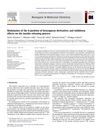 39 citations,
January 2015 in “Journal of Electroanalytical Chemistry”
39 citations,
January 2015 in “Journal of Electroanalytical Chemistry” New sensor detects minoxidil accurately and effectively.
[object Object]  14 citations,
January 2017 in “Elsevier eBooks”
14 citations,
January 2017 in “Elsevier eBooks” CBG may help with various medical conditions but needs more human research to confirm safety and effectiveness.
 26 citations,
June 2005 in “Journal of Molecular Endocrinology”
26 citations,
June 2005 in “Journal of Molecular Endocrinology” Dutasteride is more efficient than finasteride, but individual results vary.
 4 citations,
December 2014 in “European Journal of Chemistry”
4 citations,
December 2014 in “European Journal of Chemistry” Iron chloride helps create compounds that could be useful in medicine, like treating hair loss.
 November 2023 in “Dermatologic therapy”
November 2023 in “Dermatologic therapy” The scalp serum reduced scalp discomfort and symptoms without affecting skin moisture loss.
 22 citations,
August 2011 in “Journal of Supercritical Fluids”
22 citations,
August 2011 in “Journal of Supercritical Fluids” Rice bran extract might help prevent hair loss.
 260 citations,
July 2010 in “Cell”
260 citations,
July 2010 in “Cell” Mutations in the SRD5A3 gene cause a new type of glycosylation disorder by blocking the production of a molecule necessary for protein glycosylation.
 October 2022 in “Legume Research”
October 2022 in “Legume Research” The research found a way to grow plant tissue and analyze compounds in Bituminaria bituminosa, which is promising for hair restoration treatments.
 1 citations,
March 2005 in “International Journal of Cosmetic Science”
1 citations,
March 2005 in “International Journal of Cosmetic Science” Twisting hair weakens it, but strength can be recovered at low twist levels.
 6 citations,
April 2014 in “European journal of medicinal chemistry”
6 citations,
April 2014 in “European journal of medicinal chemistry” New compounds similar to cromakalim were less effective at inhibiting insulin release but improved in solubility and one acted as a calcium entry blocker, not a potassium channel opener.
[object Object]  60 citations,
January 2014 in “Anais Brasileiros De Dermatologia”
60 citations,
January 2014 in “Anais Brasileiros De Dermatologia” Nanotechnology in dermatology shows promise for better drug delivery and treatment effectiveness but requires more safety research.
 14 citations,
May 2022 in “Asian Journal of Pharmaceutical Sciences”
14 citations,
May 2022 in “Asian Journal of Pharmaceutical Sciences” New hair follicle-targeting treatments show promise for hair disorders but need more research on safety and effectiveness.
 2 citations,
September 2023 in “Scientific reports”
2 citations,
September 2023 in “Scientific reports” The nanocomposite films with vitamins and nanoparticles are promising for fast and effective burn wound healing.
 1 citations,
July 2021 in “Chemical & pharmaceutical bulletin/Chemical and pharmaceutical bulletin”
1 citations,
July 2021 in “Chemical & pharmaceutical bulletin/Chemical and pharmaceutical bulletin” Rubbing skin increases absorption of water-soluble drugs from lotions and creams, but not oil-soluble drugs.
 15 citations,
December 2015 in “Textile Research Journal”
15 citations,
December 2015 in “Textile Research Journal” Adding amber particles to polyamide fibers makes them suitable for medical textiles like compression socks.
 March 2024 in “Bioactive Materials”
March 2024 in “Bioactive Materials” New treatment using engineered nanovesicles in hydrogel improves hair growth by repairing hair follicle cells in a mouse model of hair loss.
 January 2019 in “Oncogen”
January 2019 in “Oncogen” Triple Hormonal Blockade (ADT3) can effectively manage prostate cancer but requires careful monitoring for heart risks.
 188 citations,
October 2012 in “The AAPS Journal”
188 citations,
October 2012 in “The AAPS Journal” The document concludes that developing generic topical drugs requires ensuring they match the original in quality, composition, and structure, and often involves complex testing and regulatory steps.
 39 citations,
September 2012 in “Human Reproduction”
39 citations,
September 2012 in “Human Reproduction” Certain genetic variations in the SHBG gene are linked to an increased or decreased risk of PCOS in Mediterranean women.
 November 2024 in “Fermentation”
November 2024 in “Fermentation” Fermented ginsenosides from kimchi bacteria may promote hair growth better than finasteride.
 67 citations,
January 2022 in “Theranostics”
67 citations,
January 2022 in “Theranostics” Advanced nanocarrier and microneedle drug delivery methods are more effective, safer, and less invasive for treating skin diseases.

The skin is a complex barrier for drug penetration, but understanding its structure and interactions can improve drug delivery methods.
 14 citations,
May 2008 in “Journal of proteome research”
14 citations,
May 2008 in “Journal of proteome research” Dutasteride may help reduce brain plaque linked to Alzheimer's by affecting cell energy structures and waste removal.
 5 citations,
September 2020 in “Molecules”
5 citations,
September 2020 in “Molecules” Extracts from three Polynesian plants were found to promote hair growth by affecting cell growth and gene expression related to hair.
 42 citations,
April 2011 in “Annals of Pharmacotherapy”
42 citations,
April 2011 in “Annals of Pharmacotherapy” Flutamide effectively treats female pattern hair loss with low doses showing good liver tolerance.
 37 citations,
January 2015 in “Evidence-based Complementary and Alternative Medicine”
37 citations,
January 2015 in “Evidence-based Complementary and Alternative Medicine” An extract from Quercus acutissima bark was found to reduce sebum production and block an enzyme linked to acne.
 34 citations,
August 2011 in “Journal of Natural Medicines”
34 citations,
August 2011 in “Journal of Natural Medicines” Puerariae Flos extract may help treat hair loss by blocking a hair loss-related enzyme and promoting hair growth.
 13 citations,
May 2011 in “Bioorganic & Medicinal Chemistry”
13 citations,
May 2011 in “Bioorganic & Medicinal Chemistry” Changing the 6-position on benzopyran molecules affects insulin release, with some compounds showing strong inhibitory effects.
 4 citations,
January 1998 in “Heterocycles”
4 citations,
January 1998 in “Heterocycles” Researchers made two new compounds that could be used for medicine.
 12 citations,
January 1998 in “Endocrine journal”
12 citations,
January 1998 in “Endocrine journal” Saw palmetto extract can block the enzyme that converts testosterone in pig prostate cells.






























